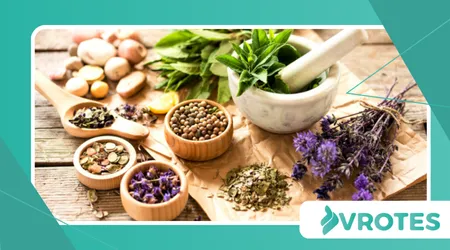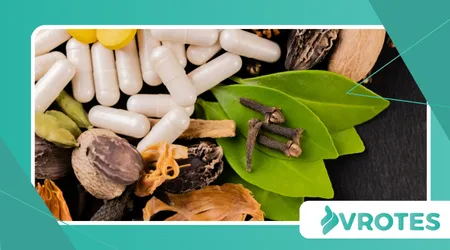Herbal Medicine and Epigenetic Influence

Herbal Medicine and Epigenetic Influence. The complex tapestry of human health is not solely woven by genetics.
Anúncios
Above and beyond the DNA helix lies the epigenome, a layer of chemical tags that dictates which genes are switched “on” or “off.” These controls act like a dimmer switch for your genetic code.
This delicate system is highly responsive to environmental factors, including diet, lifestyle, and, critically, natural compounds found in medicinal herbs. The understanding of this mechanism is truly revolutionary.
How Herbal Medicine Interacts with Our Genes
Specific phytochemicals within herbal remedies possess the molecular key to unlock or modulate these epigenetic switches.
They don’t change your innate risk; they change how your body expresses that risk.
Anúncios
These bioactive molecules can influence key epigenetic processes, such as DNA methylation and histone modification.
This regulation impacts gene transcription and subsequent protein production.
For example, a compound might inhibit an enzyme that inappropriately methylates a tumor-suppressor gene.
This action effectively “turns on” the protective gene again, promoting cellular stability.
Precision and Nuance: Beyond the Simple Cure
The action of botanical extracts is rarely blunt; it is often characterized by a sophisticated, multi-target approach. Whole herbs offer a synergy of compounds, not just a single active ingredient.
This complex interaction contrasts sharply with the single-molecule focus of most conventional pharmaceuticals. The collective effect is often greater and more balanced than the sum of its parts.
This intricate dance highlights a crucial point: the holistic approach is intrinsically linked to this epigenetic regulation. We are looking at medicine as information, not just as a drug.
Key Mechanisms and Scientifically Supported Examples
Research increasingly illuminates the precise mechanisms by which herbs exert their epigenetic effects.
Compounds like curcumin from turmeric or EGCG from green tea are prime examples.
EGCG, for instance, has been shown to modulate DNA methyltransferases (DNMTs) and histone deacetylases (HDACs).
This dual action is vital for controlling the expression of numerous genes involved in cell growth and apoptosis.
Read more: Wellness Stacking: Combining Self-Care Practices for Maximum Benefit
A relevant study published in 2023 in Nature Communications highlighted how certain plant-derived polyphenols influence the epigenetic programming of immune cells.
The researchers observed that these compounds could reprogram T-cells, effectively making them less inflammatory.
This reprogramming demonstrates a powerful potential for treating chronic inflammatory and autoimmune conditions at a fundamental cellular level.
It moves beyond symptom management to address the root cause of the cellular dysregulation.

An interesting illustration
Imagine your entire genome is a grand piano, and the sheet music is your DNA. Epigenetic marks are like the musician’s technique—pedaling, dynamics, and tempo.
The herbal compounds act as a meticulous piano tuner.
Read here: Why Forest Bathing Alters Immune Cell Activity
They don’t change the notes on the page, but they adjust the tension on the strings, ensuring every key produces the perfect, intended sound.
Herbal Medicine and Epigenetic Influence work in concert to harmonize the body’s genetic symphony, promoting optimal function.
This level of fine-tuning is what makes this field so promising for longevity.
Practical Implications for Personalized Wellness
Understanding the link between Herbal Medicine and Epigenetic Influence empowers us to create highly personalized wellness strategies.
The one-size-fits-all model of medicine rapidly becomes obsolete in this paradigm.
++ Mental Health in Youth: Prevention and Support
This is where the seasoned practitioner, well-versed in both traditional herbal knowledge and contemporary biology, excels.
They can tailor protocols based on an individual’s genetic predispositions and lifestyle factors.
The Broader Impact on Chronic Disease Herbal Medicine and Epigenetic Influence
The majority of chronic diseases—including cardiovascular issues, type 2 diabetes, and neurodegenerative disorders—have a significant epigenetic component.
Environmental stressors often trigger the wrong gene expressions.
By using targeted herbal interventions, we possess a natural tool for reversing or mitigating adverse epigenetic changes. This offers a path toward true preventative medicine.
Consider the example of the adaptogen Rhodiola rosea.
Its compounds have been shown to epigenetically improve the expression of genes related to stress response and mitochondrial function, boosting resilience under duress.
Another strong example involves the use of Silybum marianum (Milk Thistle).
Its key component, silymarin, can help protect the liver. Studies indicate it modulates epigenetic factors to enhance detox pathways, especially in contexts of metabolic syndrome.

Statistical Insight on Global Acceptance
According to a 2024 report by the World Health Organization (WHO), approximately 80% of the world’s population utilizes traditional or complementary medicine, largely based on botanical remedies, for some aspect of primary healthcare.
This statistic underscores the enduring global trust in the power of natural medicine.
Looking Ahead: The Future of Holistic Care
The convergence of genomics and phytotherapy is not just a trend; it represents a paradigm shift.
We are moving toward an era where plant-based remedies are scientifically validated at the molecular level.
This sophisticated understanding should guide future research and clinical application. It validates centuries of empirical wisdom with the rigor of modern-day laboratory analysis.
Epigenetic Targets of Common Herbs
| Herb | Key Compound | Potential Epigenetic Action | Target Condition |
| Turmeric (Curcuma longa) | Curcumin | Inhibits DNMTs, Modulates Histone Acetylation | Inflammation, Cancer Prevention |
| Green Tea (Camellia sinensis) | EGCG | Inhibits DNMTs and HDACs | Cardiovascular Health, Metabolic Syndrome |
| Garlic (Allium sativum) | Diallyl Disulfide (DADS) | Histone Deacetylase (HDAC) Inhibition | Cardiovascular Health |
| Broccoli Sprouts (Brassica oleracea) | Sulforaphane | Upregulates expression of protective genes via histone modification | Detoxification, Cancer Prevention |
Concluding Thoughts Herbal Medicine and Epigenetic Influence
The dialogue between our botanical allies and our deepest biology—the Herbal Medicine and Epigenetic Influence—is one of profound significance.
It is a compelling argument for embracing a truly holistic and individualized approach to health.
Are we finally ready to unlock the full potential of nature’s pharmacy, guided by the precision of science? The data certainly suggests that the answer is a resounding yes.
Frequently Asked Questions
Is “Herbal Medicine and Epigenetic Influence” the same as gene therapy?
No, absolutely not. Gene therapy involves directly altering or replacing segments of DNA, which is a permanent change.
Epigenetic influence simply modifies the expression of existing genes (which genes are active or silent) without changing the underlying DNA code itself. This regulation is dynamic and reversible.
How quickly can herbal medicine cause epigenetic changes?
Epigenetic changes can occur quite rapidly, sometimes within hours or days, especially in response to diet and lifestyle interventions.
However, sustained, beneficial changes that lead to long-term health improvements typically require consistent and prolonged exposure to the active herbal compounds. The timeline is highly individualized.
Should I stop my prescription medication to start using herbs for epigenetic effects?
Never stop or change prescribed medication without consulting your primary healthcare provider.
Herbs can interact with medications. Any integration of herbal medicine should be done with the guidance of a qualified healthcare professional who understands both conventional and botanical medicine.
++ Natural Bioproducts with Epigenetic Properties for Treating Cardiovascular Disorders
